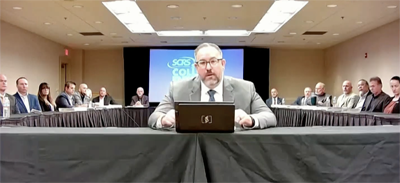The Washington State Office of the Insurance Commissioner (OIC) held a workshop this summer to discuss possible ways to address a record number of consumer complaints being filed with the office in recent years. This past April, for example, the regulator received 467 complaints, up more than 62% from a historic average of 287.
Aaron Schulenburg, executive director of the Society of Collision Repair Specialists (SCRS), testifying remotely with SCRS’s board members from more than a dozen states behind him, emphasized the need for reform in the insurance claims process. Schulenburg said the current system is failing consumers, leading to unsatisfactory settlements that leave many without the needed compensation for proper repairs.
“There’s not a business surrounding me in the room today that hasn't felt the pressure to perform a repair that would otherwise undercut what the consumer deserves,” Schulenburg said. “There’s not a business here who isn't routinely asked to perform repairs in a manner that conflicts with their professional expertise and their commitment to the vehicle owner.”
Schulenburg raised concerns about the growing reliance on photo-based and virtual appraisals driven by artificial intelligence (AI). He argued these systems often provide significantly lower estimates than what is required for a comprehensive repair, causing confusion for consumers and challenges for repair centers.
“Artificial intelligence has the potential to be more intelligent, but it's not being designed in that manner,” he said. “AI is being designed to replicate the claims practice of ‘only writing what you can see’ rather than improving upon that and writing for what they know.”
The OIC also sought input from AI estimate developers. “We asked multiple insurance company vendors that develop and utilize photo software and artificial intelligence to create repair estimates to participate today,” said David Forte, senior policy advisor for the OIC. “All of them were non-responsive to our requests.”
In addition to advocating for in-person vehicle damage estimates---Schulenburg noted “physical inspections also allow for consumers to be notified if the damage inhibits the safety of their vehicle"---he urged the Washington OIC to consider requiring an appraisal clause in insurance policies. That solution already available in some other states would create a non-litigious option for consumers to address disputes and ensure proper compensation for repairs.
“When implemented, there isn’t a business sitting here whose customer hasn’t been victorious when an independent, non-biased third-party has evaluated the repair and repair costs,” Schulenburg said of such appraisal clauses in other states. “The reality is, insurance department complaints are limited in what they can address for consumers. Actions are limited to patterns of practice and overarching behavior, not the amount of loss, not specific items that have been neglected.”
Christian Rataj, regional vice president of the National Association of Mutual Insurance Companies (NAMIC), brought an argumentative tone to workshop, calling the OIC's report on consumer complaints “misplaced, methodologically unfounded and unsubstantiated by the data sets.”
Rataj said the increased state population and number of claims in recent years would naturally lead to an increase in complaints.
“Where is the comparison of the increase in consumer complaints received by the OIC compared to the increase in consumer claims submitted to carriers?" Rataj asked.
The OIC report indicated the office’s complaint load is now more than double historic norms---while the state’s population grew just 8.6% over the period covered in the report---and the number of complaints related to auto insurance complaints is nearly 50% higher than all other lines of insurance combined. The report also said that OIC analysts “are noting suspected [insurance company] violations on nearly 1 in 5 auto complaints.”
“Suspected violations are just way too nebulous and arbitrary," Rataj said, stressing that consumer complaints should be grounded only in “actual violations of the insuring agreement or insurance code” to hold any weight, not simply based on the “policyholder’s feelings.”
Furthermore, Rataj said, the OIC failed to account for general consumer sentiment, saying consumers are struggling with “post-pandemic stress in a politically divisive and inflationary time,” implying consumers are simply more likely to complain more about everything, not just insurers.
Rataj insisted the OIC should resist “leaping to any conclusions based upon this flawed statistical analysis and take a step back,” and questioned how the OIC could suggest “that consumer complaints are an appropriate and reliable proxy for measuring claims adjusting and settlement practices.” This comment seemed to contradict earlier testimony at the workshop in which Kenton Brine, president of the Northwest Insurance Council, suggested the low percentage of consumer complaints is evidence that insurers are doing their job well.
Rataj concluded his arguments by saying any potential new regulations would lead to increased costs for the consumer, which would lead to more consumer dissatisfaction with insurers. New regulatory requirements, he said, “force insurers to reallocate staff time and resources [to comply] that could be used for claims adjusting and customer relations activities.”
The workshop, which was scheduled for two hours but stretched on to more than five hours, can be viewed online.














John Yoswick